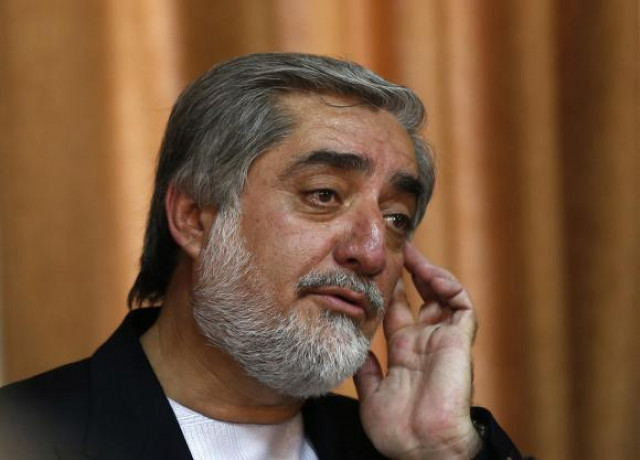Abdullah threatens to reject Afghan election result
Around 100 supporters of the presidential candidate demonstrate against the independent election commission, Karzai.

Afghan presidential candidate Abdullah Abdullah. PHOTO: REUTERS
Abdullah's complaints about alleged fraud in the run-off election have thrown the country's first democratic transfer of power into doubt ahead of preliminary results due out on July 2.
A smooth election was seen as a key benchmark of Afghan progress by the US-led coalition that has fought against insurgents and donated billions of dollars in aid since 2001 when the Taliban regime was ousted.
But the dispute could trigger instability as US-led foreign combat troops withdraw by the end of the year.
"From now onwards, since (the election authorities) have not responded to our legitimate demands... everything they do and the result of their activities will not be accepted by us," he told reporters.
Referring to the Independent Election Commission (IEC) and Election Complaints Commission (ECC), he said: "We will not consider these two institutions as legitimate from now onwards."
Abdullah had demanded the stopping of the vote count and the sacking of Zia-ul-Haq Amarkhail, head of the IEC secretariat over Amarkhail's alleged attempt to remove unused ballots from the IEC headquarters on polling day.
But the IEC refused his demands, saying it would stick to the schedule in an election that will choose a successor to President Hamid Karzai, who has ruled since the fall of the Taliban.
In a strong statement late Wednesday, the United Nations (UN) mission described Abdullah's earlier decision to suspend cooperation with the IEC as "regrettable" and it expressed its “utmost concern.”
The UN warned that if candidates “abandon the legal process and framework and appeal directly to supporters (it) could incite violence.”
"Some people have already called for civil disobedience and some incidents have already taken place," the UN said, calling for the electoral process to continue.
About 100 supporters of Abdullah demonstrated in Kabul on Thursday against the alleged fraud in the first public protests of the crisis, and he again called on his loyalists to obey the law.
"The responsibility and consequences of this crisis and this political stalemate is on the shoulders of the president and the election commissions," he added.
Pro-Abdullah protest as Afghan election dispute deepens
About 100 supporters of Afghan presidential candidate Abdullah demonstrated in Kabul on Thursday against alleged election fraud in the first public protest of a growing political crisis.
Abdullah boycotted the vote count on Wednesday, saying he was the victim of "blatant fraud" in the run-off election to chose a successor to President Hamid Karzai in Afghanistan's first democratic transfer of power.
His announcement threw the election into doubt as Afghan officials and international diplomats scrambled to keep the process on track ahead of preliminary results due out on July 2.
The UN mission warned that if candidates "abandon the legal process and framework and appeal directly to supporters (it) could incite violence."
In a strong statement late Wednesday, the UN described Abdullah's decision to suspend cooperation with the IEC as "regrettable" and expressed its "utmost concern."
"Some people have already called for civil disobedience and some incidents have already taken place," it said.
At the small demonstration in central Kabul, Abdullah supporters chanted slogans against the IEC and Karzai.
"We're here to support Abdullah Abdullah. We are going to defend our vote because we're proud of it," said Mohmmad Hashim, a 25-year-old student and one of the protest organisers.
"We are going to stay here until Abdullah is president."
A smooth election was seen as a key test of the 13-year international military and civilian effort to develop Afghanistan since the fall of the Taliban regime in 2001.
But Abdullah's stand against the IEC has ignited a dispute that could trigger instability as US-led foreign combat troops withdraw by the end of the year.



















COMMENTS
Comments are moderated and generally will be posted if they are on-topic and not abusive.
For more information, please see our Comments FAQ